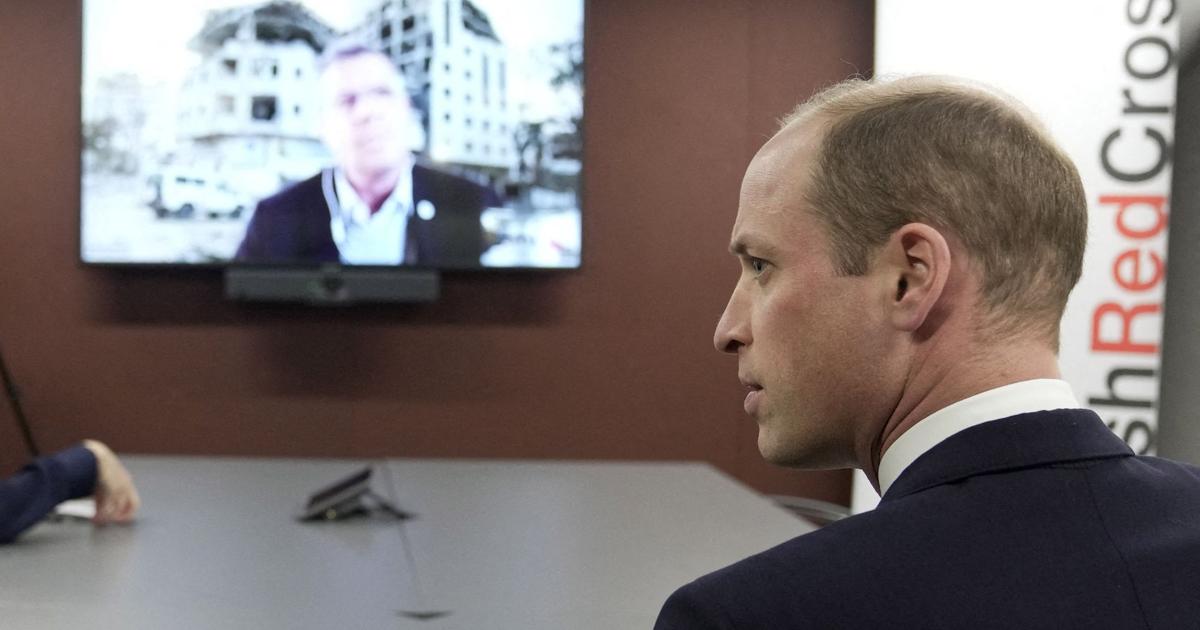The epidemiologist William Hanage, with half a meter of snow on his street, says that he often travels to Spain on vacation and is looking forward to returning, because he "craves tapas, good weather and a glass of manzanilla".
Hanage, co-director of the Center for the Dynamics of Infectious Diseases at Harvard University (USA), is surprised to learn that in Spain it is mandatory since the end of December to wear a mask on the street.
“Outdoors?” he asks strangely in a video call from his home in the US city of Cambridge.
The researcher, born in the English town of Penzance 48 years ago, usually summarizes the situation of the covid pandemic with lapidary phrases.
When it began to become clear a month and a half ago that the omicron variant of the coronavirus was somewhat milder, but much more contagious, he proclaimed: “The difference between a caress and a slap is, to a large extent, speed.”
When the idea spread in January that covid is already an endemic disease, something like the flu, Hanage wrote on his social networks: “The omicron is not endemic at this time, in the same way that the Moon is not a hamster".
The epidemiologist considers it "foolish" to say that the omicron variant will be the end of the pandemic, but he is convinced that, after this wave, life will be different.
Ask.
When will the pandemic end?
Answer.
Pandemics do not have an official end, with someone ringing the bells, fireworks and people shouting hooray, like: “Okay, that's it, it's over, back to normal life”.
It does not work like that.
What happens is that there are successive waves of the disease, which can sometimes be quite damaging and, over time, can reach the point where people find its consequences tolerable.
The only way to have a clean end to the pandemic is to eradicate the virus, but given the omicron variant and the fact that the coronavirus is infecting wild animals, it is clearly not going to be eradicated.
P.
There are doctors who maintain that the omicron is the end of the pandemic.
R.
Yes, I do not understand.
People are eager to say that.
The omicron is closer to the end of the pandemic, of course, if only because it has come later.
In the US we now have as many hospital admissions as in the worst moments of the pandemic.
We have about 2,000 deaths a day.
Omicron is causing an astronomical number of cases.
The consequences will probably not be small: both in the diseases it will cause and in the immunity it will generate.
If I have to make an educated guess from the data, I would say that after omicron, severe cases in young, vaccinated people will be even more rare.
Introduction of the virus into groups of older and vulnerable people, such as nursing homes, will likely continue to be a concern.
But only very optimistic people, with little memory or,
Only very optimistic people, with little memory or a little foolish make resounding statements in the middle of a pandemic
P.
What future scenarios do you consider?
A.
In the best of cases, the immunity generated by the omicron and the defenses produced by the vaccines will mean that we will no longer see serious waves that put the health system in trouble.
In the worst case, new variants capable of causing more serious diseases will emerge, although I think this is highly unlikely.
But they could be capable of, at least, causing chaos if many people get infected, which is what has happened with the omicron.
The problem has not only been the number of people hospitalized, but also health workers have been infected.
If you have an ICU with trained personnel on leave, it is no longer an ICU, it is a bed with a machine next to it.
Q.
You plan to come to Spain for a few days on vacation.
Here 81% of the population is vaccinated.
A.
That's fantastic.
Q.
And almost 100% of people over 70 years of age are vaccinated with at least two doses.
Will you go to bars, clubs, large events in Spain?
R.
I am always attentive to the local situation.
I am a fan of Arsenal football club and at the end of the summer, when there were very few cases here in Cambridge, I would happily go to the pub to watch the games and have a few beers with my friends.
I haven't done it in the last few weeks, because around 10% of the population was infected by the omicron.
P.
When will a grandson be able to calmly kiss his 95-year-old grandfather again?
R.
Everyone misses that.
You have to be very careful with outright statements, but I think it is reasonable to think that in the summer we will have a low enough number of cases to be able to return to something closer to that situation.
It is very important that older people receive booster doses.
In Massachusetts we have fewer infections
per capita
than the UK, but we have almost twice as many deaths.
One of the reasons is that the United Kingdom has given the booster dose to 90% of the population over 65 years of age, but here it is 70%.
It may seem like it's about the same, but it's three times worse.
Because if you protect 90% of the population, you have 10% unprotected.
And if you protect 70%, you have 30% unprotected.
I do not wear the mask outdoors
P.
Right now in Spain it is mandatory to wear a mask on the street, outdoors.
A.
Outdoors?
Q.
Yes, outdoors.
It is mandatory regardless of distance from other people [the government plans to remove the requirement next week].
Do you think it is a measure that makes sense?
A.
I do not wear the mask outdoors.
I wear it when I go to a closed public place.
And, frankly, I see no downside to continuing to wear the mask next winter when entering the supermarket or on public transport.
In a very, very critical situation, with a big wave, I can imagine [outdoors] being recommended, but I haven't worn a mask outdoors in the entire recent omicron wave.
P.
In Spain, people go with the mask on the street and take it off inside the bar.
A.
That is completely useless!
[Laughter].
My favorite example of measures that are difficult to understand is that the authorities in the United Kingdom insisted that students had to wear a mask to go from one class to another at school, but inside the class they could take it off, to be seated next to from other classmates for an hour.
This is not understanding the true routes of transmission of the virus.
P.
The president of the Spanish Government, Pedro Sánchez, and the British, Boris Johnson, have suggested that the time is approaching to treat covid as an endemic disease, like the flu.
Are we close to that moment?
A.
People don't know what endemic means.
Does not know.
When people talk about an endemic disease, they are usually referring to a stable level of disease, which does not have large fluctuations.
That doesn't mean it's light.
Millions of people die from tuberculosis, which is an endemic disease in many parts of the world.
And malaria is also an endemic disease in many parts of the planet.
Endemic is an epidemiological concept that has been adopted by people and reconverted to indicate a finish line, a phase in which nothing needs to be done.
I think this is dangerous.
And I think it's also dangerous to say that we're going to be like this all our lives, because it's not true.
The more you try to get closer to normality by acting as if everything is normal, the more abnormal things will become.
P.
Do you think we are close to that stability?
R.
I understand people's rush to turn the page, but unfortunately, the more you try to get closer to normality by acting as if everything is normal, the more abnormal things will be, because the virus will have more opportunities.
Perhaps the most damaging thing in recent years has been the determination of some people to pretend that the pandemic did not exist.
That is the reason why in some parts there have been so many difficulties.
There has been a lack of leadership in many places.
Some may be excused, but what is inexcusable is the failure to learn from mistakes.
In a pandemic it is never too late to do better.
Even now that we are much closer to the end of the pandemic, we must remember that we have reached a point where we can save lives by giving booster doses.
Q.
You have stated that the coronavirus is not endemic right now, in the same way that the Moon is not a hamster.
A.
Correct.
Luna is not a hamster and the omicron is not endemic.
Endemic means there is a stable level of disease.
In Spain, it went from 5,000 cases a day before the omicron to peaks of more than 130,000 cases a day.
Is that stability?
Does that sound endemic?
No. That's not to say that it will never be endemic, but pretending that it is is already one of the strangest things I've seen in the last two years.
And I have seen many strange things.
P.
People are very tired of the pandemic.
In Spain, many people have decided that the pandemic is over for them.
The bars are full.
And almost everyone (81%) is vaccinated, many people have already had covid and more than 90% of those over 60 years of age also have the booster dose.
In this context, what would you advise a healthy, vaccinated person in a country where almost everyone is vaccinated?
What is there to wait for?
R.
Raising it as a wait may not be the most appropriate.
There is always a balance between what we would like to do and the risks we want to take.
A young, healthy person who is vaccinated and goes to a bar is at very, very low risk.
But if a young and healthy person goes to a bar and soon goes to visit an older person in their family, without taking precautions and without having done a rapid test, there can be problems.
And then there is persistent covid, which unfortunately is not being studied enough.
Preliminary data suggest that it is less common in vaccinated people, but infected young people can also have long-term sequelae.
People who are at low risk can be happy doing whatever they want,
but they must remember that the situation can change and that not everyone is lucky enough to be in their position.
And it will help what we can all do to prevent the transmission of a virus that remains dangerous.
There are some people who oppose any kind of restriction and there are others who want us to eradicate the virus.
Both extremes are irrational
Q.
There is a general idea that viruses lose their virulence over time.
R.
It is completely false.
For an infectious disease, the important thing is to be transmitted.
If with increased virulence it is more likely to be transmitted to another host, then virulence will thrive by natural selection.
The chances of ending up in the hospital with the first variant we heard about, the alpha, were maybe 20-50% higher than the previous version.
One virus was replaced by a more dangerous one, which in turn was replaced by an even more dangerous one, the delta variant.
And now the omicron has arrived.
People say it's mild, but it's only slightly milder at best.
Most of the lower severity we're seeing is due to prior immunity.
The so-called Spanish flu of 1918 and 1919 did not become a milder disease because the virus became more friendly,
but because it continued to circulate in a population that increasingly had greater immunity.
And that is exactly what we are seeing now.
Q.
Omicron is not the covid virus evolving into a cold.
R.
No. Anyone who has been attentive to social networks will have seen that there are some people who oppose any type of restriction and who basically want us to allow the virus to circulate freely.
And there are also people who want us to eradicate the virus and think that any middle ground is consenting to a massacre.
Both extremes are irrational.
And they increasingly identify with political positions, there are no scientific reasons.
The fundamental thing in a pandemic is to prevent your health system from being saturated.
And, in many places, they are facing this saturation again and again.
There are many things we can do to mitigate the waves, but the most important thing is vaccinations.
There are many people already vaccinated and there is also a significant percentage of the population that has passed the infection and has defenses.
You can write to us at
manuel@esmateria.com
or follow
MATERIA
on
,
,
or subscribe to our
newsletter here
.
Exclusive content for subscribers
read without limits
subscribe
I'm already a subscriber

/cloudfront-eu-central-1.images.arcpublishing.com/prisa/NGH3UVP4ONFADFGFHPRT2W5ULY.jpg)







/cloudfront-eu-central-1.images.arcpublishing.com/prisa/BRELC53OVVE7BNEDN7AXWOIAZ4.JPG)